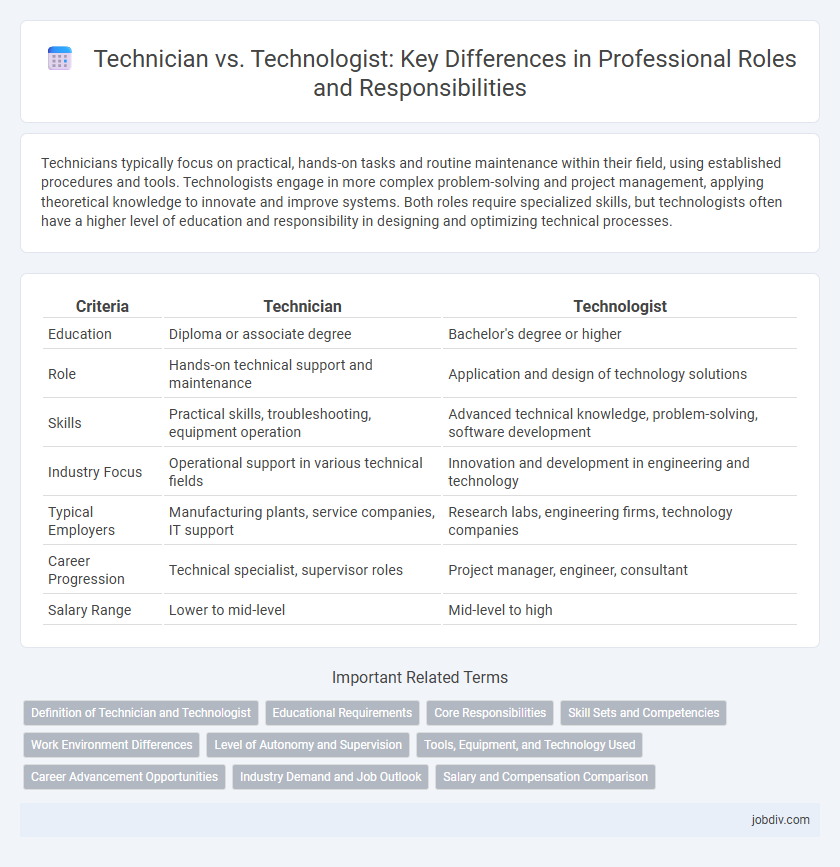Technicians typically focus on practical, hands-on tasks and routine maintenance within their field, using established procedures and tools. Technologists engage in more complex problem-solving and project management, applying theoretical knowledge to innovate and improve systems. Both roles require specialized skills, but technologists often have a higher level of education and responsibility in designing and optimizing technical processes.
Table of Comparison
| Criteria | Technician | Technologist |
|---|---|---|
| Education | Diploma or associate degree | Bachelor's degree or higher |
| Role | Hands-on technical support and maintenance | Application and design of technology solutions |
| Skills | Practical skills, troubleshooting, equipment operation | Advanced technical knowledge, problem-solving, software development |
| Industry Focus | Operational support in various technical fields | Innovation and development in engineering and technology |
| Typical Employers | Manufacturing plants, service companies, IT support | Research labs, engineering firms, technology companies |
| Career Progression | Technical specialist, supervisor roles | Project manager, engineer, consultant |
| Salary Range | Lower to mid-level | Mid-level to high |
Definition of Technician and Technologist
A technician is a skilled worker trained to operate, maintain, and repair specific equipment or systems, often requiring practical knowledge and hands-on experience. A technologist applies advanced technical and engineering principles to design, analyze, and improve technology-based solutions, usually supported by a broader theoretical education. Both roles are essential in fields such as healthcare, engineering, and information technology, with technicians focusing on implementation and technologists on innovation and system optimization.
Educational Requirements
Technicians typically require a diploma or associate degree in their field, focusing on practical skills and hands-on training to support technological operations. Technologists often pursue a bachelor's degree, emphasizing theoretical knowledge, advanced problem-solving abilities, and comprehensive understanding of complex systems. Educational programs for technologists are designed to prepare them for leadership roles in design, development, and management within various technical industries.
Core Responsibilities
Technicians perform hands-on tasks such as equipment maintenance, troubleshooting, and basic technical support to ensure operational efficiency. Technologists apply advanced knowledge to design, analyze, and optimize systems, often engaging in project management and complex problem-solving. Both roles collaborate to maintain technical standards but differ in scope and level of expertise.
Skill Sets and Competencies
Technicians possess specialized hands-on skills focused on equipment operation, troubleshooting, and routine maintenance, enabling them to execute technical tasks effectively. Technologists demonstrate advanced competencies in system design, process improvement, and analytical problem-solving, often integrating theoretical knowledge with practical application. Both roles require proficiency in industry-specific tools and technologies, but technologists typically undertake more complex project responsibilities and strategic planning.
Work Environment Differences
Technicians typically work in hands-on environments such as laboratories, workshops, or production floors where they perform routine maintenance, testing, and troubleshooting tasks. Technologists often operate in more varied settings, including research facilities, corporate offices, and project management sites, engaging in the design, implementation, and optimization of systems. The distinction in work environments highlights technicians' focus on practical execution and technologists' involvement in strategic planning and problem-solving within technical fields.
Level of Autonomy and Supervision
Technicians typically operate under close supervision, executing specific tasks and following detailed instructions within established protocols. Technologists possess a higher level of autonomy, applying advanced technical knowledge to troubleshoot, design, and manage complex systems with minimal oversight. The distinction in supervision reflects the broader scope of responsibilities and decision-making authority granted to technologists in professional environments.
Tools, Equipment, and Technology Used
Technicians primarily work with specialized tools and equipment to perform hands-on tasks, maintenance, and troubleshooting, often using diagnostic devices and manual instruments tailored to specific systems. Technologists leverage advanced technology and software platforms to design, analyze, and improve complex systems, integrating data analytics and automation tools to optimize workflows. The distinction lies in technicians applying practical skills to operate and repair, while technologists focus on technological innovation and system enhancement.
Career Advancement Opportunities
Technologists typically have greater access to career advancement opportunities due to their broader technical education and expertise, enabling roles in management, design, and research. Technicians often focus on hands-on application and maintenance tasks, which may limit upward mobility to supervisory or specialized operational roles. Pursuing further certifications and advanced degrees can enhance both technicians' and technologists' potential for career growth and leadership positions in technical fields.
Industry Demand and Job Outlook
Technicians and technologists both play crucial roles in industries such as healthcare, engineering, and IT, with technicians typically focusing on practical, hands-on tasks and technologists engaging in more complex problem-solving and system design. Industry demand for technicians remains strong due to the need for skilled workers to support routine maintenance and technical operations, reflecting steady job growth projected by the Bureau of Labor Statistics. Technologists generally experience higher job prospects and salary potential, driven by expanding roles in technology development, management, and specialized applications within sectors like manufacturing and information technology.
Salary and Compensation Comparison
Technologists typically earn higher salaries than technicians due to their advanced education and specialized skills, with average annual salaries ranging from $60,000 to $85,000 compared to technicians' $40,000 to $60,000. Compensation packages for technologists often include benefits such as performance bonuses and paid certifications, whereas technicians may receive more limited benefits. Industry demand also influences salary variations, with technologists in fields like engineering and healthcare commanding premium pay.
Technician vs Technologist Infographic

 jobdiv.com
jobdiv.com